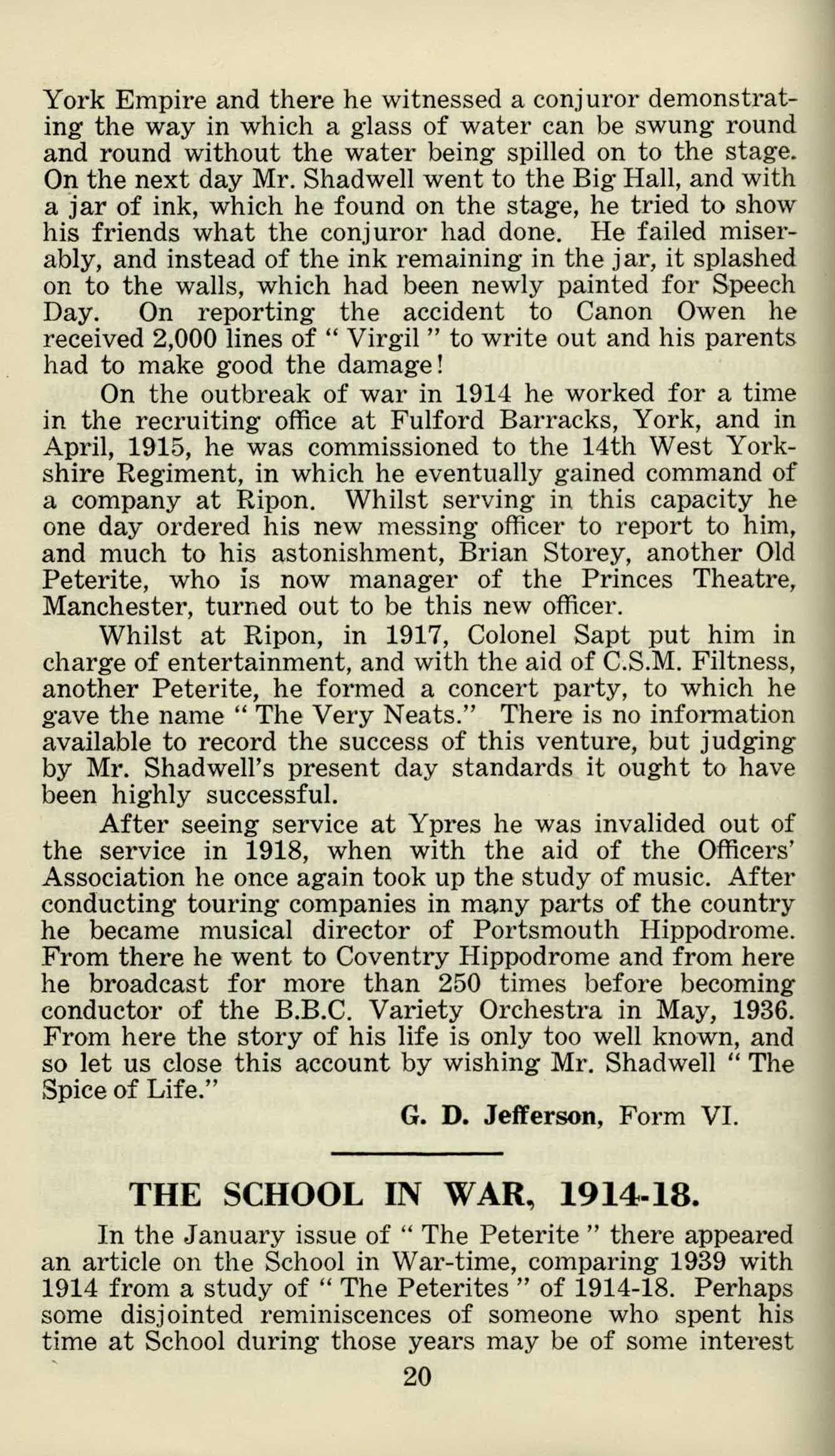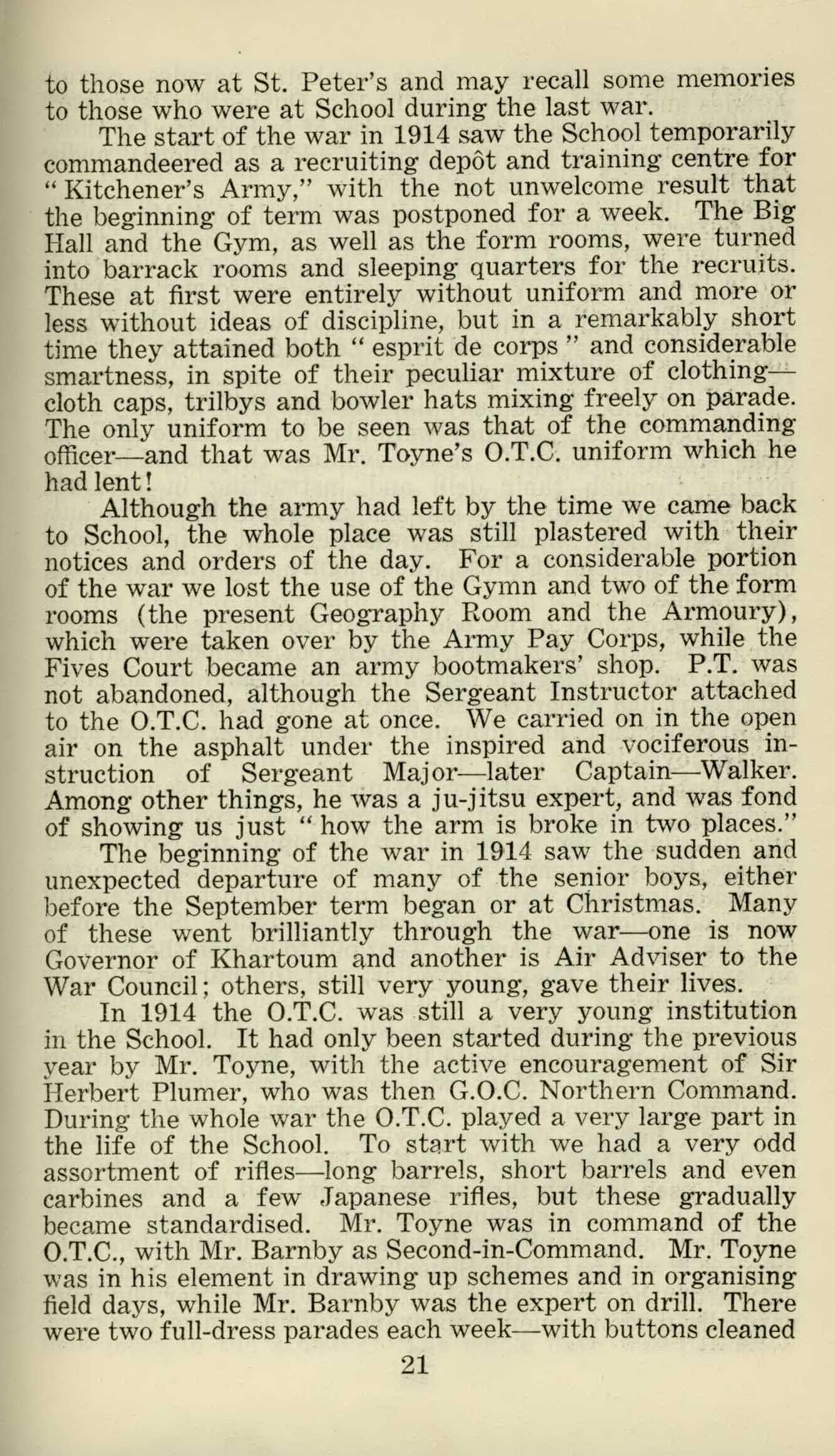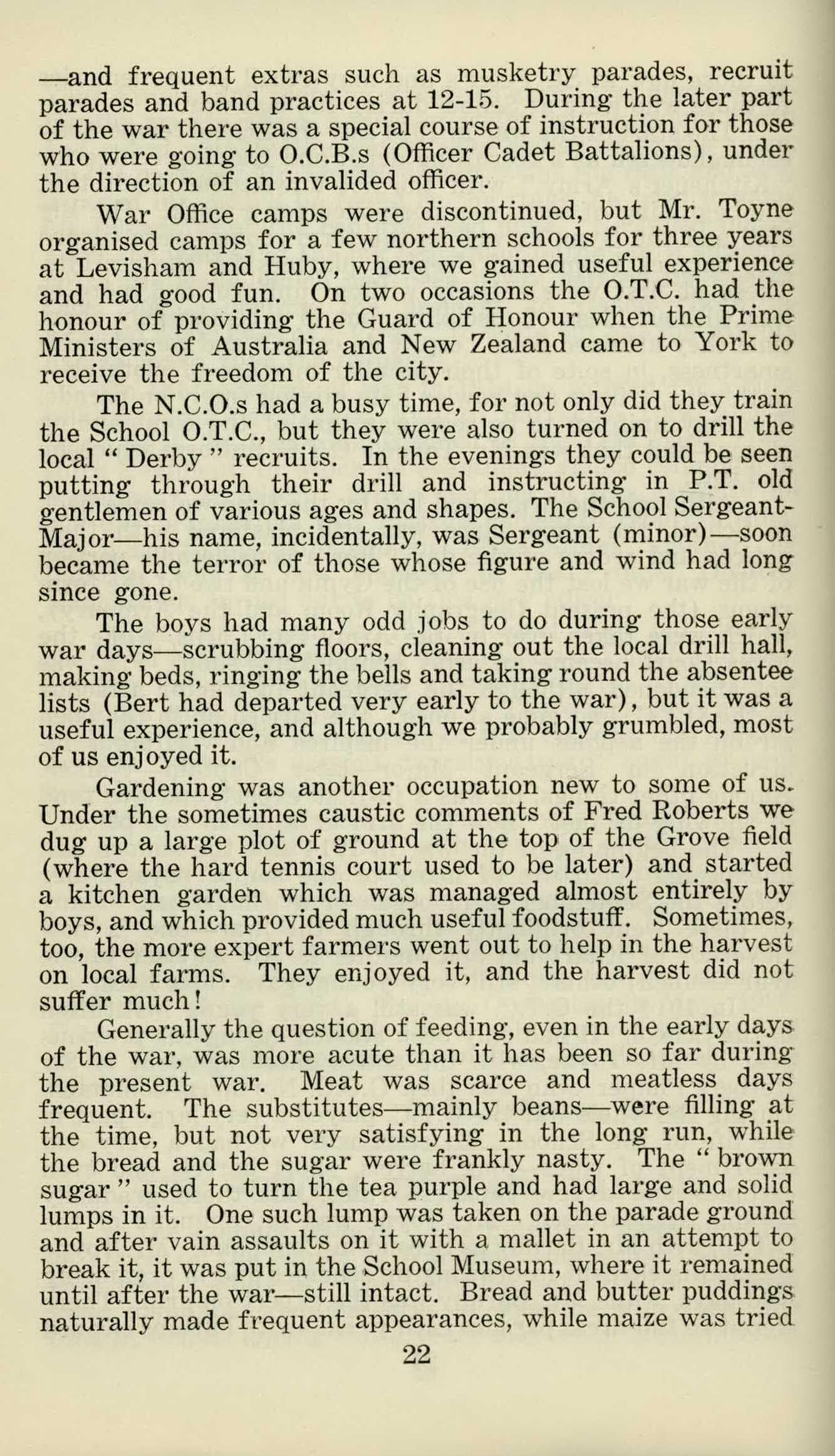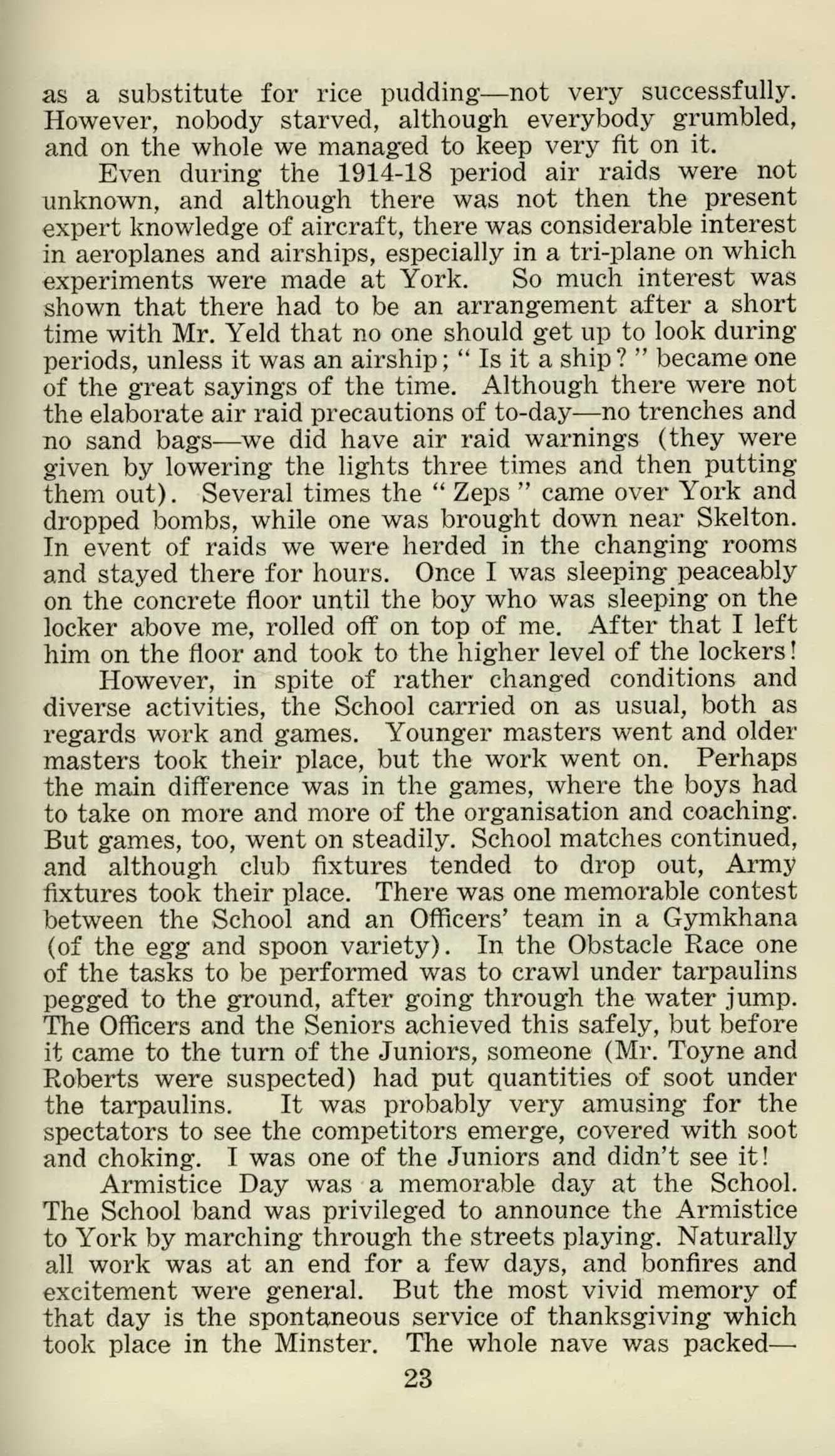
9 minute read
The School in War, 1914-18
from April 1940
by StPetersYork
York Empire and there he witnessed a conjuror demonstrating the way in which a glass of water can be swung round and round without the water being spilled on to the stage. On the next day Mr. Shadwell went to the Big Hall, and with a jar of ink, which he found on the stage, he tried to show his friends what the conjuror had done. He failed miserably, and instead of the ink remaining in the jar, it splashed on to the walls, which had been newly painted for Speech Day. On reporting the accident to Canon Owen he received 2,000 lines of " Virgil " to write out and his parents had to make good the damage !
On the outbreak of war in 1914 he worked for a time in the recruiting office at Fulford Barracks, York, and in April, 1915, he was commissioned to the 14th West Yorkshire Regiment, in which he eventually gained command of a company at Ripon. Whilst serving in this capacity he one day ordered his new messing officer to report to him, and much to his astonishment, Brian Storey, another Old Peterite, who is now manager of the Princes Theatre, Manchester, turned out to be this new officer.
Whilst at Ripon, in 1917, Colonel Sapt put him in charge of entertainment, and with the aid of C.S.M. Filtness, another Peterite, he formed a concert party, to which he gave the name " The Very Neats." There is no information available to record the success of this venture, but judging by Mr. Shadwell's present day standards it ought to have been highly successful.
After seeing service at Ypres he was invalided out of the service in 1918, when with the aid of the Officers' Association he once again took up the study of music. After conducting touring companies in many parts of the country he became musical director of Portsmouth Hippodrome. From there he went to Coventry Hippodrome and from here he broadcast for more than 250 times before becoming conductor of the B.B.C. Variety Orchestra in May, 1936. From here the story of his life is only too well known, and so let us close this account by wishing Mr. Shadwell " The Spice of Life."
G. D. Jefferson, Form VI.
THE SCHOOL IN WAR, 1914-18.
In the January issue of " The Peterite " there appeared an article on the School in War-time, comparing 1939 with 1914 from a study of " The Peterites " of 1914-18. Perhaps some disjointed reminiscences of someone who spent his time at School during those years may be of some interest 20
to those now at St. Peter's and may recall some memories to those who were at School during the last war.
The start of the war in 1914 saw the School temporarily commandeered as a recruiting depot and training centre for " Kitchener's Army," with the not unwelcome result that the beginning of term was postponed for a week. The Big Hall and the Gym, as well as the form rooms, were turned into barrack rooms and sleeping quarters for the recruits. These at first were entirely without uniform and more or less without ideas of discipline, but in a remarkably short time they attained both " esprit de corps " and considerable smartness, in spite of their peculiar mixture of clothing— cloth caps, trilbys and bowler hats mixing freely on parade. The only uniform to be seen was that of the commanding officer—and that was Mr. Toyne's O.T.C. uniform which he had lent!
Although the army had left by the time we came back to School, the whole place was still plastered with their notices and orders of the day. For a considerable portion of the war we lost the use of the Gymn and two of the form rooms (the present Geography Room and the Armoury), which were taken over by the Army Pay Corps, while the Fives Court became an army bootmakers' shop. P.T. was not abandoned, although the Sergeant Instructor attached to the O.T.C. had gone at once. We carried on in the open air on the asphalt under the inspired and vociferous instruction of Sergeant Major—later Captain—Walker. Among other things, he was a ju-jitsu expert, and was fond of showing us just " how the arm is broke in two places."
The beginning of the war in 1914 saw the sudden and unexpected departure of many of the senior boys, either before the September term began or at Christmas. Many of these went brilliantly through the war—one is now Governor of Khartoum and another is Air Adviser to the War Council ; others, still very young, gave their lives.
In 1914 the O.T.C. was still a very young institution in the School. It had only been started during the previous year by Mr. Toyne, with the active encouragement of Sir Herbert Plumer, who was then G.O.C. Northern Command. During the whole war the O.T.C. played a very large part in the life of the School. To start with we had a very odd assortment of rifles—long barrels, short barrels and even carbines and a few Japanese rifles, but these gradually became standardised. Mr. Toyne was in command of the O.T.C., with Mr. Barnby as Second-in-Command. Mr. Toyne was in his element in drawing up schemes and in organising field days, while Mr. Barnby was the expert on drill. There were two full-dress parades each week—with buttons cleaned 21

—and frequent extras such as musketry parades, recruit parades and band practices at 12-15. During the later part of the war there was a special course of instruction for those who were going to O.C.B.s (Officer Cadet Battalions), under the direction of an invalided officer.
War Office camps were discontinued, but Mr. Toyne organised camps for a few northern schools for three years at Levisham and Huby, where we gained useful experience and had good fun. On two occasions the O.T.C. had the honour of providing the Guard of Honour when the Prime Ministers of Australia and New Zealand came to York to receive the freedom of the city.
The N.C.O.s had a busy time, for not only did they train the School O.T.C., but they were also turned on to drill the local " Derby " recruits. In the evenings they could be seen putting through their drill and instructing in P.T. old gentlemen of various ages and shapes. The School SergeantMaj or—his name, incidentally, was Sergeant (minor)—soon became the terror of those whose figure and wind had long since gone.
The boys had many odd jobs to do during those early war days—scrubbing floors, cleaning out the local drill hall, making beds, ringing the bells and taking round the absentee lists (Bert had departed very early to the war), but it was a useful experience, and although we probably grumbled, most of us enjoyed it.
Gardening was another occupation new to some of us. Under the sometimes caustic comments of Fred Roberts we dug up a large plot of ground at the top of the Grove field (where the hard tennis court used to be later) and started a kitchen garden which was managed almost entirely by boys, and which provided much useful foodstuff. Sometimes, too, the more expert farmers went out to help in the harvest on local farms. They enjoyed it, and the harvest did not suffer much !
Generally the question of feeding, even in the early days of the war, was more acute than it has been so far during the present war. Meat was scarce and meatless days frequent. The substitutes—mainly beans—were filling at the time, but not very satisfying in the long run, while the bread and the sugar were frankly nasty. The " brown sugar " used to turn the tea purple and had large and solid lumps in it. One such lump was taken on the parade ground and after vain assaults on it with a mallet in an attempt to break it, it was put in the School Museum, where it remained until after the war—still intact. Bread and butter puddings naturally made frequent appearances, while maize was tried 22

as a substitute for rice pudding—not very successfully. However, nobody starved, although everybody grumbled, and on the whole we managed to keep very fit on it.
Even during the 1914-18 period air raids were not unknown, and although there was not then the present expert knowledge of aircraft, there was considerable interest in aeroplanes and airships, especially in a tri-plane on which experiments were made at York. So much interest was shown that there had to be an arrangement after a short time with Mr. Yeld that no one should get up to look during periods, unless it was an airship; " Is it a ship? became one of the great sayings of the time. Although there were not the elaborate air raid precautions of to-day—no trenches and no sand bags—we did have air raid warnings (they were given by lowering the lights three times and then putting them out). Several times the " Zeps " came over York and dropped bombs, while one was brought down near Skelton. In event of raids we were herded in the changing rooms and stayed there for hours. Once I was sleeping peaceably on the concrete floor until the boy who was sleeping on the locker above me, rolled off on top of me. After that I left him on the floor and took to the higher level of the lockers !
However, in spite of rather changed conditions and diverse activities, the School carried on as usual, both as regards work and games. Younger masters went and older masters took their place, but the work went on. Perhaps the main difference was in the games, where the boys had to take on more and more of the organisation and coaching. But games, too, went on steadily. School matches continued, and although club fixtures tended to drop out, Army fixtures took their place. There was one memorable contest between the School and an Officers' team in a Gymkhana (of the egg and spoon variety). In the Obstacle Race one of the tasks to be performed was to crawl under tarpaulins pegged to the ground, after going through the water jump. The Officers and the Seniors achieved this safely, but before it came to the turn of the Juniors, someone (Mr. Toyne and Roberts were suspected) had put quantities of soot under the tarpaulins. It was probably very amusing for the spectators to see the competitors emerge, covered with soot and choking. I was one of the Juniors and didn't see it!
Armistice Day was a memorable day at the School. The School band was privileged to announce the Armistice to York by marching through the streets playing. Naturally all work was at an end for a few days, and bonfires and excitement were general. But the most vivid memory of that day is the spontaneous service of thanksgiving which took place in the Minster. The whole nave was packed- 23











